| |
|
|
|
James Linsday Badley
First Lieutenant
480TH TAC FTR SQDN, 366TH TAC FTR WING, 7TH AF United States Air Force Hermiston, Oregon April 16, 1942 to March 27, 1968 JAMES L BADLEY is on the Wall at Panel 46E, Line 43 See the full profile or name rubbing for James Badley |

  |
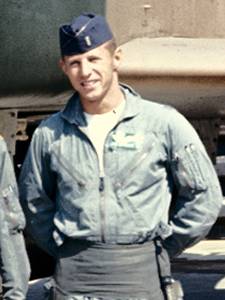
|
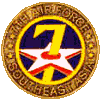
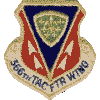

| |
"It is better to have lived one day as a lion
From his brother, |
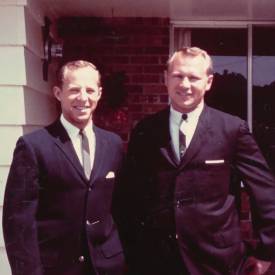 Jim and Don Badley August 1967 |
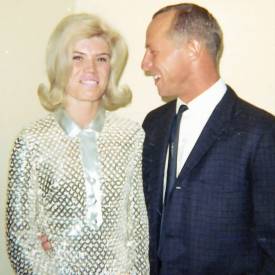 Lynda Twyman and Jim Badley May 1967 |
|
In April of 1967, I visited Jim at Davis-Monthan AFB in Tucson, Arizona. One night Jim lit candles placed around his living room and then turned off all the lights. He read me his favorite poems, and one in particular -- "Birches" by Robert Frost -- made me think of Vietnam and what Jim was about to experience. I quote: And life is too much like a pathless wood Where your face burns and tickles with the cobwebs Broken across it, and one eye is weeping From a twig's having lashed across it open. I'd like to get away from earth awhile And then come back to it and begin over. May no fate willfully misunderstand me And half grant what I wish and snatch me away Not to Return. Earth's the right place for love: I don't know where it's likely to go better." The last night of my stay in Tucson we attended a party at the Officers' Club. I wore a beautiful, silver, sequined dress, which Jim absolutely loved -- he was so proud of me that he introduced me to everyone in sight. During one of the evening's many introductions, a young officer asked if we were married and Jim replied, "No, not yet. I'm working on it." We sat at a big, round table with a group of about ten people. John Martin, Jim's future aircraft commander, was sitting directly across from us. When Jim's roommate asked me to dance, I said "yes" and tried to get up, but Jim pulled me right back down into the chair. I made a joke to his roommate that we'd better sit this one out, and he laughed. Then Jim turned my chair around to face him and told me that he loved me and wanted to marry me. I must not have replied right away, because I remember Jim asking, "Is there anyone else in this room who loves anyone else?" Laughing at his nonsensical query on whether or not I returned his love, I told him that I did indeed love him but would have preferred discussing the subject in a more private manner. But privacy wasn't a concern of Jim's that evening, for he continued to profess his love openly -- albeit quietly it was still obvious to everyone -- and his friends smiled knowingly as they teased us. He was completely oblivious to what was going on around him: the people at the table asked him questions that he wasn't able to answer, because he didn't hear them. We danced all the slow dances, and each time we returned to the table, Jim would go through the same routine: he would turn our chairs to face each other, tell me he loved me and wanted to marry me, and then he would just sit there and gaze at me. He was definitely in another world. After Jim was killed on March 27, 1968, I reflected back on that night in Tuscon when he read me Robert Frost's poem "Birches" and I realized how closely Frost's sentiments paralleled Jim's Vietnam experience. While he was in Vietnam, Jim's letters were filled with sorrow for his fallen buddies, yet he always maintained a positive and hopeful spirit in the face of it all. He was certain we were helping the South Vietnamese people -- "a pleasant, happier people you couldn't find, in spite of these miseries" -- he said in a letter home. I know Jim's only regret was that he couldn't do more for his Air Force buddies and the people he went to serve. There was a light in Jim that uplifted us all, then and now, and he is sorely missed by many. In terms of our relationship, I finally faced his death, which had haunted me for over twenty years, by writing an account of his personal life and his military service. The book is called "Angels Unknown, A story of healing after Vietnam" and was published in January of 2002. It is the account of a fine man and his influence on those who loved him.
Lynda Twyman Paffrath |
|
Notes from The Virtual WallOn 27 March 1968, Captain Richard L. Whitteker and 2nd Lieutenant James L. Badley, both of the 480th Tactical Fighter Squadron, departed Danang Air Base on a strike mission into North Vietnam. Jim Badley did not return from his 85th mission - their F-4D PHANTOM went down in North Vietnam.
Although both men were initially listed as Missing in Action, an Air Force review board determined that the circumstances of their loss were such that survival was not possible and recommended that their status be changed. The recommendation was approved on 08 May 1968 and their status was changed to "Hostile Loss/Died while Missing/Body not Recovered". As of 5 July 2002, neither Whitteker's nor Badley's remains have been repatriated.
Jim Badley was graduated from Oregon State University with the Class of 1965 and was commissioned as a Second Lieutenant in the U. S. Air Force Reserve. He began flight training at Williams AFB, received his wings in October 1966, and received F-4 training at Davis-Monthan AFB before reporting to the 480th TFS at Danang in September 1967. Badley was shot down on his 25th mission on 20 Nov 67 but was rescued. His actions while on the ground during the rescue operation warranted the award of the Silver Star. Captain John Martin, who was flying as aircraft commander that day, did not survive the incident. On 14 Mar 68, Badley assisted in providing RESCAP support during a successful effort to pick up two downed aviators; he was awarded the Distinguished Flying Cross and the Air Force Commendation Medal for his efforts. As noted above, Jim Badley's remains have not been repatriated - but a memorial stone to him was placed in the Willamette National Cemetery (Portland, Oregon) on 23 May 1969. His father, Burton E. Badley, LTC, USAF (Ret), was buried there as well on 7 Dec 1979. |
| Contact Us | © Copyright 1997-2019 www.VirtualWall.org, Ltd ®(TM) | Last update 08/15/2019. |